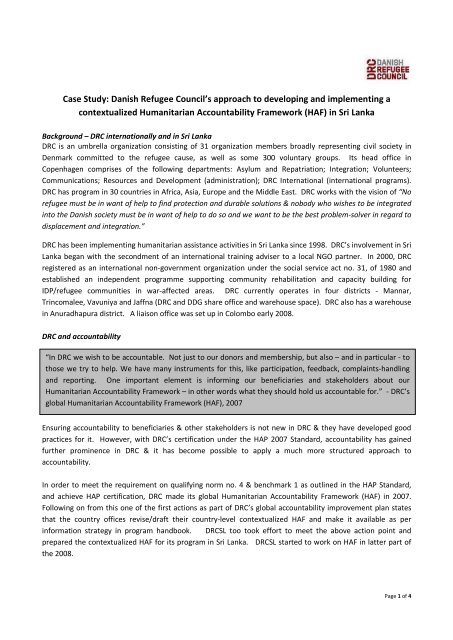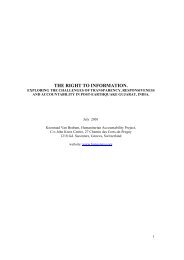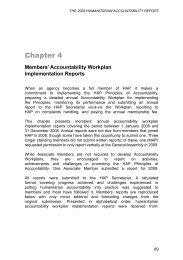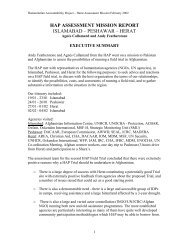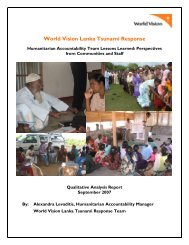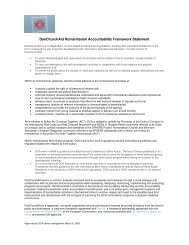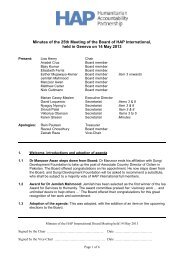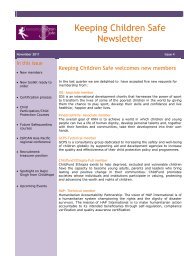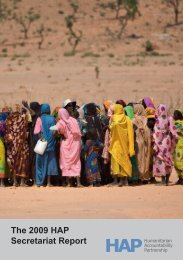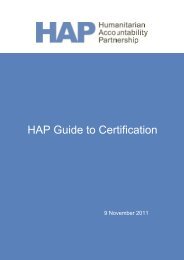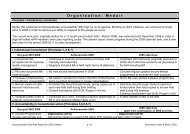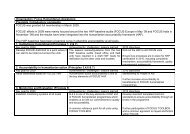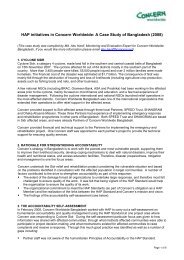Case Study: Danish Refugee Council's ... - HAP International
Case Study: Danish Refugee Council's ... - HAP International
Case Study: Danish Refugee Council's ... - HAP International
You also want an ePaper? Increase the reach of your titles
YUMPU automatically turns print PDFs into web optimized ePapers that Google loves.
<strong>Case</strong> <strong>Study</strong>: <strong>Danish</strong> <strong>Refugee</strong> Council’s approach to developing and implementing a<br />
contextualized Humanitarian Accountability Framework (HAF) in Sri Lanka<br />
Background – DRC internationally and in Sri Lanka<br />
DRC is an umbrella organization consisting of 31 organization members broadly representing civil society in<br />
Denmark committed to the refugee cause, as well as some 300 voluntary groups. Its head office in<br />
Copenhagen comprises of the following departments: Asylum and Repatriation; Integration; Volunteers;<br />
Communications; Resources and Development (administration); DRC <strong>International</strong> (international programs).<br />
DRC has program in 30 countries in Africa, Asia, Europe and the Middle East. DRC works with the vision of “No<br />
refugee must be in want of help to find protection and durable solutions & nobody who wishes to be integrated<br />
into the <strong>Danish</strong> society must be in want of help to do so and we want to be the best problem-solver in regard to<br />
displacement and integration.”<br />
DRC has been implementing humanitarian assistance activities in Sri Lanka since 1998. DRC’s involvement in Sri<br />
Lanka began with the secondment of an international training adviser to a local NGO partner. In 2000, DRC<br />
registered as an international non-government organization under the social service act no. 31, of 1980 and<br />
established an independent programme supporting community rehabilitation and capacity building for<br />
IDP/refugee communities in war-affected areas. DRC currently operates in four districts - Mannar,<br />
Trincomalee, Vavuniya and Jaffna (DRC and DDG share office and warehouse space). DRC also has a warehouse<br />
in Anuradhapura district. A liaison office was set up in Colombo early 2008.<br />
DRC and accountability<br />
“In DRC we wish to be accountable. Not just to our donors and membership, but also – and in particular - to<br />
those we try to help. We have many instruments for this, like participation, feedback, complaints-handling<br />
and reporting. One important element is informing our beneficiaries and stakeholders about our<br />
Humanitarian Accountability Framework – in other words what they should hold us accountable for.” - DRC’s<br />
global Humanitarian Accountability Framework (HAF), 2007<br />
Ensuring accountability to beneficiaries & other stakeholders is not new in DRC & they have developed good<br />
practices for it. However, with DRC’s certification under the <strong>HAP</strong> 2007 Standard, accountability has gained<br />
further prominence in DRC & it has become possible to apply a much more structured approach to<br />
accountability.<br />
In order to meet the requirement on qualifying norm no. 4 & benchmark 1 as outlined in the <strong>HAP</strong> Standard,<br />
and achieve <strong>HAP</strong> certification, DRC made its global Humanitarian Accountability Framework (HAF) in 2007.<br />
Following on from this one of the first actions as part of DRC’s global accountability improvement plan states<br />
that the country offices revise/draft their country-level contextualized HAF and make it available as per<br />
information strategy in program handbook. DRCSL too took effort to meet the above action point and<br />
prepared the contextualized HAF for its program in Sri Lanka. DRCSL started to work on HAF in latter part of<br />
the 2008.<br />
Page 1 of 4
Development of the HAF<br />
The steps taken to draft the contextualized HAF are given below.<br />
• Program coordinator – South & South East Asia and DRCSL Country Representative together drafted the<br />
outline with basic elements for the contextualized HAF.<br />
• This draft was circulated among the staff members of DRCSL for their suggestions.<br />
• The 1 st draft has been finalized in April 2009.<br />
• Though it was originally developed in English, it was translated into local languages (Tamil & Sinhalese).<br />
• The translated HAF was issued to each and every staff members.<br />
Implementation of HAF<br />
• Published in DRC website – www.drc.dk in 2009.<br />
• Placed on office notice board.<br />
• Issued to partner organization & beneficiary representatives (Community based organization) of the<br />
integrated rehabilitation project.<br />
• Training was conducted on HAF with all staff with the objective of increasing their knowledge on the<br />
commitments made by DRC & their role in implementing the HAF.<br />
• As DRC is implementing all its integrated projects through local partner organizations, they too were<br />
trained on the HAF.<br />
• DRCSL trained its staff members to required level on the codes, laws, standards that DRC has committed<br />
to work within, including for example Sphere minimum standard, <strong>HAP</strong> Standard, GPID, Universal<br />
Declaration of Human Rights, and <strong>International</strong> <strong>Refugee</strong> Law.<br />
• Some other commitments made in the HAF are already in practice, for example INGO registration, shop &<br />
business act, Sri Lankan labor law; other procedures need to be followed by INGO.<br />
• As the beneficiaries can raise questions on DRC’s commitments, they were also trained on DRC’s HAF and<br />
some important points such as background of the organization, objectives, complaint mechanism, were<br />
issued to beneficiaries. It was reinforced during the field visits and it is planned to share this information<br />
at the inauguration meetings in the future.<br />
Figure 1 & 2: Group work & discussion with community<br />
Page 2 of 4
Holding DRC to account<br />
The community can raise their queries during the community meeting or they<br />
can submit their queries or comments in writing. The written feedback can be<br />
submitted through post, via e-mail, through the suggestion box that is placed<br />
in each project location of durable solution projects, or via any DRC staff.<br />
When they submit it through DRC staff, on the spot acknowledgement slip will<br />
be given, for postal queries acknowledgement will be sent through post, & for<br />
e-mail queries it will be sent through e-mail. Queries sent through suggestion<br />
boxes will be acknowledged in a register maintained by the community. These<br />
will be handled through DRC’s complaint mechanism.<br />
Main topics in the HAF<br />
• Brief description of the country program<br />
• DRC’s objectives, partners and stakeholders in Sri Lanka<br />
• Organization structure for DRC Sri Lanka<br />
• The codes, laws, and standards within which DRC Sri Lanka is<br />
committed to working<br />
• DRC Sri Lanka relations to beneficiaries<br />
o Community Based Development<br />
o Complaint mechanisms<br />
• List of current programs<br />
• Accountability Baseline and Accountability Improvement Plan<br />
Figure 3 & 4: Suggestion box<br />
fixed in a village<br />
Figure 5 & 6: Finalized HAF placed on a notice board<br />
Impact and benefits<br />
To observe the impact will take time, & little changes have been observed in the behavior & attitude.<br />
• Beneficiaries have started to use the suggestion boxes<br />
• DRC management is now trying its best to handle the complaints formally<br />
• Partners & staff morally accepted the need for a complaint mechanism<br />
• Reinforced the necessity to have a ToR<br />
Page 3 of 4
• <strong>HAP</strong> mainstreaming was delegated to a staff member<br />
• Developed & modified some processes to meet the requirement – e.g. Staff induction plan,<br />
• Documents related to the implementation of quality management system were shared with all staff<br />
Challenges<br />
• It took a long time to finalize the 1 st draft of the HAF.<br />
• Train the staff, partners & beneficiaries has cost, in terms of funds, time and other resources<br />
• It will take time to internalize by staff.<br />
• As it is a living document it needs up-dates frequently.<br />
• Numerous changes in staff<br />
Suggestions made by DRC staff to improve implementation of the HAF<br />
• Make it attractive – E.g. Print in leaflet style, color print, using pictures to explain<br />
• Issue to beneficiaries or their representation groups – in all project villages<br />
• Train the beneficiaries & partners - share it in the inauguration meetings with partners & beneficiaries,<br />
conduct workshops to partners & reinforce the use in monthly meeting.<br />
• Include in annual budget costs needed for: trainings, revision, translation,<br />
• Revise it in a frequent manner – annually or at set regular intervals<br />
• Simplify the organization structure (district level) when giving it to beneficiaries<br />
For more information about:<br />
This case study and how DRC developed their HAF for Sri Lanka contact:<br />
Selvi (Field Officer - M&E, in Sri Lanka) selvi@drc-lk.org<br />
<br />
<br />
<br />
DRC’s global HAF, and other country contextualized HAFs see:<br />
the DRC website www.drc.dk/relief-work/humanitarian-accountability-framework/<br />
DRC’s Complaints Handling Handbook see:<br />
the DRC website www.drc.dk/Complaints_Mechanism.4637.0.html<br />
<strong>HAP</strong>, the <strong>HAP</strong> Standard, and <strong>HAP</strong> certification see:<br />
the <strong>HAP</strong> website www.hapinternational.org<br />
Page 4 of 4


